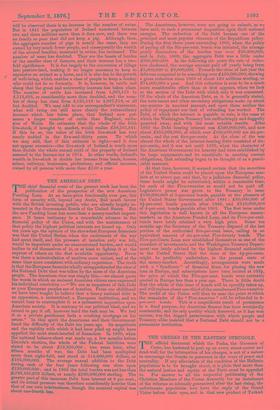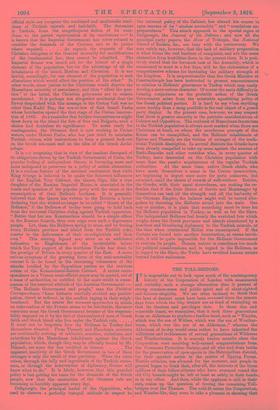THE GREEKS IN THE EASTERN STRUGGLE.
official document which the Pasha, the Governor of Crete, has hastened to post up on every street-corner and dead-wall for the information of his charges, is not of a nature to encourage the Greeks to persevere in the ways of peace and neutrality. If any alleviation of the condition of the Hellenic population is to be brought about, it is plain that more than the natural justice and equity of the Porte must be appealed to. For answer to all the respectful petitioning of the Christian Members of the Cretan Assembly for an instalment of the reforms so solemnly guaranteed after the last rising, the unfortunate population now have the reply of the Grand Vizier before their eyes, and in that new product of Tallish official style can recognise the unaltered and unalterable tradi- tions of Turkish misrule and bad-faith. The document is Turkish, from the magniloquent fiction of its exor- dium to the patent equivocation of its conclusions :—" It is known that the Imperial Government has never refused to consider the demands of the Cretans, and to do justice where required. . . . . . As regards the requests of the Christian delegates of the General Assembly for modifications of the fundamental law, they cannot be admitted. The Imperial firman was issued, not for the behoof of a single element of the population, but for the advantage of all the inhabitants of the island, Moslem and Christian. It is not lawful, accordingly, for one element of the population to seek alterations which would affect the position of the other." In other words, since justice to the Christians would deprive the Mussulman minority of ascendancy, and thus " affect the posi- tion" of the latter, the Christian grievances are to remain unredressed. It is perhaps not altogether accidental that the Envoy despatched with this message to the Cretan Vail was no other than Kadri Bey, the son-in-law of that Ismail Pasha whose butcheries opened the first stage of the Cretan insurrec- tion of 1866. As a reminder that further remonstrances might draw down on the island the fate of Scio and Bulgaria, such a choice had doubtless its significance. To make ready for contingencies, the Ottoman fleet is now cruising in Cretan waters, under Hobart Pasha, who has just tried to minimise Turkish crimes, with instructions to keep a general look-out on the Greek sea-coast and on the isles of the Greek Archi- pelago.
It is not surprising that in view of the insolent disregard of its obligations shown by the Turkish Government of Crete, the popular feeling of independent Greece is becoming more and more indisposed to persevere in a policy of selfish abstention. It is a curious feature of the national excitement that while King George is believed to be under the deterrent influences of the English Tory Cabinet, the Queen, Olga, like a true daughter of the Russian Imperial House, is associated in the toasts and speeches of the popular party with the cause of the emancipation of their Hellenic brethren. It is generally believed that the Queen has written to the Hetairia a letter declaring that she wished no longer to be called " Queen of the Hellenes," if the Hellenes of to-day were going to hold back from the universal Christian rising against Turkish oppression. " Better that her son Konstantinos should be a simple officer in the Russian Guards, than ever reign over such a degenerate people. Let, then, the Hellenes spring to arms, and by freeing every Hellenic province and island from the Turkish yoke, concur in the deliverance of their co-religionists and their own." This stirring legend may serve as an additional indication to Englishmen of the incalculable injury which the Tory support of the worthless Turks has done to the prestige of Britain in every quarter of the East. A more serious symptom of the growing force of the anti-neutrality current is to be found in the increasing vehemence of the attacks levelled by the Opposition parties on the cautious action of the Komunduros-Zaimis Cabinet. A recent corre- spondence in a Vienna semi-official paper may be quoted, out of a mass of authorities, as entitled to the more credit in conse- quence of the reserved attitude of the Austrian Government :— " The Hellenic Government and people," says the Political Correspondence, "have hitherto carefully avoided any partici- pation, direct or indirect, in the conflict raging in their neigh- bourhood. But the nearer the moment approaches in which an intervention of the Powers seems to be inevitable, the more conscious must the Greek Government become of the responsi- bility imposed on it by the fact of the numbers of men of Greek
faith and Greek blood who live under the Turkish rule It must not be forgotten how the Hellenes in Turkey find themselves situated. From Thessaly and Macedonia accounts are continually arriving of robberies, murders, violations, and extortions by the Mussulman inhabitants against the Greek population, which, though they may be officially denied by Mr. Disraeli, are none the less credited in Greece The apparent inactivity of the Greek Government in face of these outrages is only the result of wise prevision. When the crisis arises, through the folly and ingratitude of the Turkish states- men, or through the intervention of diplomacy, Greece will know what to do." It is likely, however, that this guarded policy is fast getting too tame for the demands of the Greek people, now that the enormities of the Ottoman rule are becoming so horribly apparent every day. Deligeorgis, the principal leader of the Opposition, who used to observe a perfectly tranquil attitude in respect to
the external policy of the Cabinet, has altered his course to open censure of its " aimless neutrality " and " scandalous un-
preparedness." This attack appeared in the special organ of
Deligeergis, the Journal of the Debates ; and now all the principal party papers, the Hour of Trikupis, the National Guard of Zaimis, &c., are busy with the controversy. We may safely say, however, that the lack of military preparation
is what forms the real burthen of complaint, and not the mere abstention from hostilities down to the present time. It is posi- tively stated that the foremost task of the Assembly, which is
summoned to meet in a few days, will be the elaboration of a comprehensive scheme for increasing the military strength of the kingdom. It is unquestionable that the Greek Minister at Constantinople has been instructed to present remonstrances in relation to Hellenic grievances in Turkey which may easily develop amore serious character. Of course the main difficultyin forming conjectures on the probable action of the Greek Government arises from the miserable squabbling policy of the Greek political parties. It is hard to say when anything more worthy than a snug portfolio is the real object of a grand party display. In the present case, however, we may suspect that there is greater sincerity in the patriotic manifestations of Cabinet and Opposition. The outburst of Mussulman fanaticism in the Turkish population is always most marked when there are Christians at hand, on whom the murderous precepts of the Koran can be exemplified, and the Hellenic inhabitants of Epirus and Thessaly are the victims of outrages of the tradi- tional Turkish description. In several districts the Greeks have been already compelled to take up arms against the swarms of Bashi-Bazouks and other wretches who, in every quarter of Turkey, have descended on the Christian population with more than the passive acquiescence of the regular Turkish authorities. At the same time, native Greek chiefs, who have made themselves a name in the Cretan insurrection, are beginning to depart once more for parts unknown, but surmised, amid the cheers of crowds of well-wishers. Besides, the Greeks, with their usual shrewdness, are making the re- flection that if the little States of Servia and Montenegro by themselves can task all the strength and all the barbarity of the Ottoman Empire, the balance might well be turned alto- gether by throwing the Hellenic sward into the scale. One way or another, it is plain that something must be done for the Hellenic population in Turkey, as well as for the Slays. The independent Hellenes feel keenly the wretched fate which weighs down the Greek provinces and islands abandoned by a heartless and blundering diplomacy to the Turkish misrule, at the time when continental Hellas was emancipated. If the Cretans are forced into another insurrection, as seems inevit- able, it will be quite impossible for the Hellenic Government to restrain its people. Human nature is sometimes too much for political considerations, and in regard to the Hellenes, as in regard to the Slays, the Turks have revolted human nature beyond further endurance.



































 Previous page
Previous page